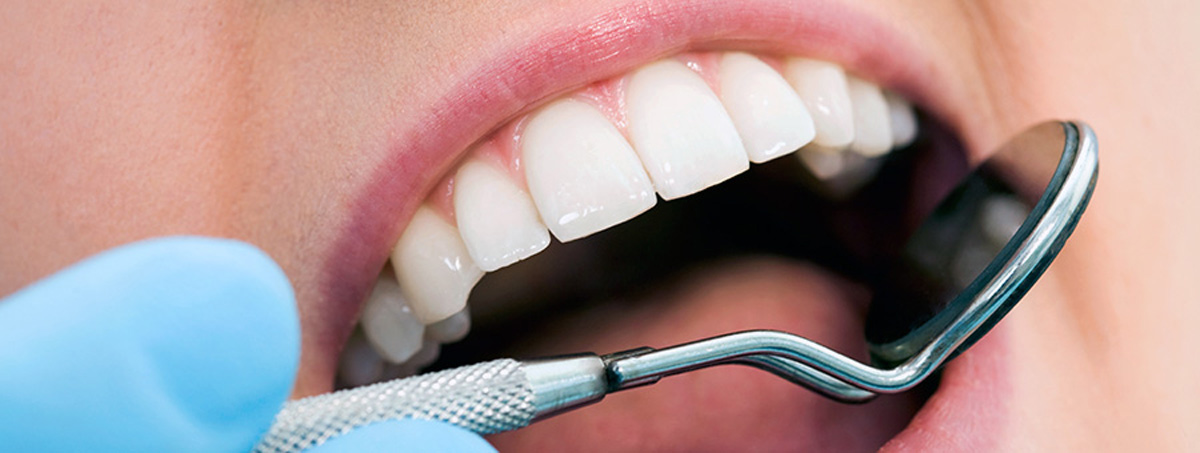
Gum Disease Treatment Las Vegas
Las Vegas gum disease treatment, also known as periodontal disease treatment, is a painless and common problem affecting many people - even people who think they practice good oral hygiene. There are several stages of gum disease, from mild to severe; but if gum disease is left untreated it can lead to infection and tooth loss.
ABC Dental Care in Las Vegas knows that gum disease is common, but that every patient is unique. Dr. Khorshid and his team work with each patient one-on-one to help them understand how to treat and prevent gum disease.
Types Of Gum Disease
The first and most mild form of gum disease is called gingivitis. When you do not brush your teeth often enough, or you brush but do not floss, plaque builds up along the tooth near the gum line. Plaque is a sticky buildup of bacteria, and when it is not removed from teeth, it causes a mild infection. Signs of gingivitis are gums that bleed when brushed, are red rather than pink, and appear swollen.
Most people will develop mild gingivitis at some point in their lives, but it can be easily treated with the help of your dentist. If left untreated, however; the problem can get much worse.
As gingivitis worsens it becomes known as periodontitis. The difference between gingivitis and periodontitis is that the gums actually begin to separate from the teeth. The spaces caused by this separation become a haven for food and bacteria. The body sees this debris as an infection and works to fight the invasion. This battle at the gum line actually makes the problem worse.
The bacteria and infection-fighting enzymes begin to break down the teeth, gum tissue and even the bone surrounding the teeth. This gives the bacteria, even more, room to spread, and the cycle worsens. As the spaces continue to grow, teeth are no longer held in place and they become loose. Periodontitis is the leading cause of preventable tooth loss in adults.
Other Causes Of Gum Disease
Other factors that can lead to gingivitis and periodontitis are:
- Diabetes – Patients with diabetes have trouble fighting off infection making them prone to gum disease.
- Medications – Certain medications can create “dry mouth” which means the patient doesn’t produce enough saliva to break down food and bacteria, leaving them susceptible to gingivitis.
- Hormones – Puberty, menstruation, and menopause cause hormonal changes in the body which can affect its ability to fight off infection, sometimes leading to gum disease.
- Smoking – Everyone knows smoking is bad for the lungs, but it’s also very bad for the gums. The chemicals are taken into the body from smoking leave gums unable to repair themselves.
- Immune Diseases and Deficiencies – Diseases that affect the immune system leave the gums vulnerable to infection.
Gum Disease Treatment Options
The good news is that with regular dental checkups, gum disease is easily treated, especially in the early stages. If gingivitis has progressed into periodontitis, Dr. Khorshid will design an individual treatment plan based on the stage and severity of the problem. The goal of treatment is to stop the progression of the disease and help the gums reattach and grow in a healthy manner.
Scaling and planing is a common, nonsurgical way to treat gum disease that has progressed beyond gingivitis. During this procedure, the gums and teeth are numbed and the doctor will deep clean below the gum line (scaling) and smooth any rough tooth surfaces to keep bacteria out (planning).
More severe cases of gum disease will require surgical procedures depending on the location and severity of the infection. Tissue grafts may be required in cases where gums have receded, bone grafts may be required if bone has been lost, or pocket reduction surgery may be required to “fit” the gums around loose teeth.
Dr. Khorshid works with each patient individually to determine the best course of treatment for all forms of gum disease.
Caring For Your Gums
If you’ve been diagnosed with gum disease, it is imperative that you improve your daily dental hygiene immediately. Gingivitis is preventable in most cases, and regular brushing, flossing and checkups are usually all that are needed to keep bacteria at bay.
If you need to have surgical treatment to repair your gums, Dr. Khorshid will provide a course of antibiotic treatment to keep new infections from forming while you heal.
Prolonged swelling, bleeding or pain should be reported to the office immediately. Once you are healed, you may be required to come into the office for cleanings more than twice a year in order to maintain your gum health.
